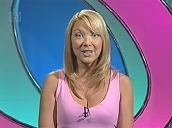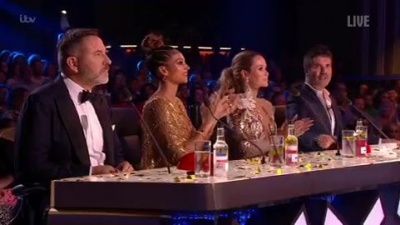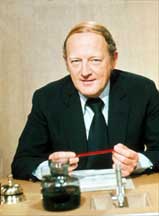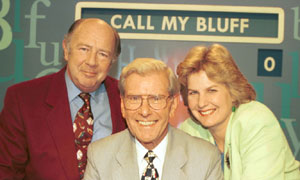Weaver's Week 2024-06-30
Last week | Weaver's Week Index | Next week
All through the summer, we're looking at the game shows with the most distinct episodes. Last week, we measured Big Brother at over 4000 episodes, and Bamboozle! had about 5900 eps.
Correction centre: when we first published last week, we incorrectly counted the number of Blankety Blank episodes. We got confused and missed a full series of 14 episodes. We are a complete load of [BLANK]s. The revised total is 320 primetime episodes.
This week, difficult historical questions with Robert Robinson.
Contents |
The game shows with the most episodes (part 3 of more than we thought)
Brain of Britain / What Do You Know?
Radio's premier cleverclogs quiz began in 1951, as "Ask Me Another", the main part of What Do You Know?. Originally played by academics and panellists, the genius move was to get listeners like you to play. "Ask Me Another" would offer one point for the first question you got right; you could then bank the point or take question two for two, and stop at any point until question five for five points. But get one wrong and you score nothing for your whole turn, and your opponents can pick it up for two bonus marks. Ten to the Top must have been taking notes.
The other elements of What Do You Know? – a memory test, spot the deliberate mistakes, and questions to the panel – were phased out in favour of the straightforward quiz. And a more simple scoring system came in by the late 1950s – one point per question, easy enough for Franklin Engelmann to cope with. Robert Robinson and Russell Davies have been the other permanent hosts, Peter Snow and Ian Gillies hosted while regular presenters were indisposed.
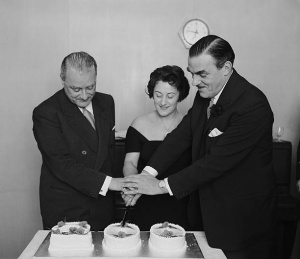 Creator John P. Wynn, producer Joan Clark and host Franklin Engelmann celebrate the 200th episode in 1960. (BBC)
Creator John P. Wynn, producer Joan Clark and host Franklin Engelmann celebrate the 200th episode in 1960. (BBC)Brain of Britain (as the quiz became in 1968) also crowns a Brain of Brains every third year (we're due another one later this year) and a Top Brain every nine series (next due in 2027). Until 1973, the finalists also did a challenge match, against panellists from another Radio 4 programme – we'd be interested to hear Brain of Britain go in a battle of intellectual wits against Front Row or the smartiepants from More or Less.
All of this obscures a difficult question. When What Do You Know? began, radio was clearly a senior medium to television. At some point, television became more popular. We can argue about when this crossover happened – was it the launch of ITV in 1955; the last time evening radio regularly attracted bigger audiences than telly circa 1958; when ITV became a national service in 1962.
Slightly arbitrarily, we're going to say that evening programmes on radio count as "primetime" until the end of 1959; from 1960, no radio show counts as "primetime".
So, in the 1950s, What Do You Know? has 200 primetime episodes – a pilot, 192 regular episodes, and 7 challenge matches. 31 episodes in 1960, then 29 eps a year from 1961-67. What Do You Know? has 432 episodes, of which 200 are primetime.
Under the name Brain of Britain, there were 29 episodes a year from 1968 to 1973. A restructure from 1974-88 had 25 episodes a year, plus Brain of Brains and Top Brain as scheduled. Since 1989, it's been 17 episodes a year (and no grand final aired in 2008). That's a total of 1147 episodes.
But we must also include last year's ornithological special Bird Brain of Britain. And the challenge match Masterbrain against winners of black-seat show Mastermind – these were made by the radio production team, and only aired on radio. 12 of those challenges, the Bird Brain special, for an additional 13.
And combining the total for the two names, we get 1592 episodes, of which 200 primetime.
Brain of Sport was a similar quiz, specialising in sport. Hosted by the tremendous sports commentator Peter Jones, the show came to an end after his untimely death in 1990. 15 series of 13 eps, so 205 episodes.
The Brains Trust
Academic discussion in an accessible format. Based on the American format Information Please, a panel of learned gentlemen gave their thoughts on questions sent in by the listeners. Often argumentative, sometimes heated, it made compelling listening during the war.
Listeners' letters went from the sublime to the ridiculous: there were questions of fact, discussions about philosophy, and apparent trap questions. The panellists never knew what was going to be asked, their responses completely spontaneous. Donald McCullough was the host, deemed the "question master" by producer Howard Thomas.
Spin-off editions included Back Yard Brains Trust, questions about the garden; Listeners Brains Trust, where the regular panel were replaced by listeners; Junior Brains Trust, with children answering, and Transatlantic Brains Trust going back to the show's roots. Home Service Wales made Welsh Brains Trust, translating the format into Cymraeg.
Taken off the radio in 1949, the format was revived for television in 1955. BBC producers wanted something sharper and familiar to compete with the nascent ITV. Armchairs and coffee tables made for a more relaxed programme, less of the cut-and-thrust of the radio show. The telly show ran to 1961, with a television revival in 1996 and on Radio 3 from 1998-2001.
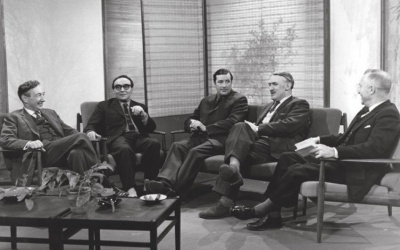 The panel for the 12 January 1961 edition, the last regular edition of the original TV run: left to right, AJ Ayer, Jacob Bronowski, Robert Bolt, Alan Bullock and chairman Norman Fisher. (BBC)
The panel for the 12 January 1961 edition, the last regular edition of the original TV run: left to right, AJ Ayer, Jacob Bronowski, Robert Bolt, Alan Bullock and chairman Norman Fisher. (BBC)On radio
1941, as Any Questions – 33 episodes
1941-49, as The Brains Trust – 280 eps
1947-49 and 1957, Welsh Brains Trust – 22 eps
1960, a special starring a young Dennis Potter and chaired by Shirley Williams – 1 ep
1962-64, Vintage Brains Trust, edits compiled from previous editions and with new linking material – 18 eps
1998-2001, on Radio 3 – 42 eps
On film
1942 – 3 new films (plus one film of a radio show, which we're not counting)
On television
1946 – pilot – 1 ep
1955-59 – offpeak – 211 eps
1959-61 – primetime – 62 eps
1959-61 – as Seiat Holi in Welsh – primetime – 12 eps
1996 – 6 primetime eps
Most of the television episodes were repeated later the same week in the Home Service. We've only counted these once, for television.
The term "Brains Trust" quickly moved into common parlance for any gathering of experts – as early as 1942, Farming Today asked listeners to "put questions to our Brains Trust". In this vein, we do not count Byd Natur, the Welsh Naturalists' Brains Trust – this show ran fortnightly from 1948 to 1967, dying with the Home Service Welsh – 478 episodes.
Remembering that all radio shows are primetime until the end of 1959, we make that 416 primetime episodes and 691 episodes in total.
Phew, that was quite the brainteaser.
Brainteaser
Cheap and cheerful daytime programme from Channel 5, an entertaining half-hour puzzling spread over an hour. If it's remembered at all, Brainteaser is remembered for inventing the call-and-lose competition – "winners" to the contest were picked from the crew backstage.
Approx 1200 eps
There's a small genre of topical news quizzes. Credit to BBC Radio Scotland's Breaking the News, the best of the genre from this island – by the end of last year, it had reached 139 episodes. (If you're after a great anglophone topical quiz, tune your podcast to Because News on CBC Radio 1.)
Another small genre is improvised comedy shows. In the first few years after it came on air, Channel 5 had Bring Me the Head of Light Entertainment – Graham Norton gives his friends silly things to do. Not quite topical, never quite repeated. Approximately 62 primetime episodes in its four series.
Britain's Got Talent
Simon Cowell tries to find someone with more talent than him. Over the years, it's given us dance acts like Diversity, singing acts like Susan Boyle, magicians like X, performing dogs like Ashleigh and Pudsey, and all sorts of others.
209 episodes in the main series until the end of 2023. Spin-off series Britain's Got More Talent ran on ITV2 until the end of 2019, with 166 transmissions. There was a Champions series in 2021 (6 episodes), and two special episodes (Golden Moments in 2020, Magicians in 2022).
That's a total of 383 primetime episodes.
Britain's Next Top Model
Remember UK Living? A pay-television channel for women? It had a local version of the Next Top Model machine, which ran on and off from 2005 to 2017. 138 primetime episodes, and this column couldn't tell you what happened in any of them.
Bullseye
Iiiin one! Jim Bowen, an animated bull, darts, throwers and knowers, the prize board, nothing in this game for two in a bed, and a speedboat to take back to your tower block in Aston.
369 episodes, but we have to ponder if they are primetime? Bullseye usually went out before religious programmes, after 5pm on Sunday teatime. Given that it's the weekend, it would be churlish and absurd to say that it wasn't a primetime programme, so come on in, sit yourself down, super, smashing, great. 369 primetime episodes.
Busman's Holiday
Teams of three were linked by a common job, and would answer questions on world geography, each other's jobs, their own work, and one of a few prepared possible destinations. Decent little idea, perhaps National Lottery Jet Set drew a few ideas from this series – but we'll come to that later.
Busman's Holiday ran on and off from 1985 to 1993, and squeaks in with 103 primetime episodes.
Call My Bluff
Honestly, you wait forever for one Robert Robinson show to come along, then two turn up at once. [dings bell]
Call My Bluff is a lovely simple game. Three celebrities try to deceive each other about the real meaning of words. The correct answer is written out for the player, the others on the team have to improvise an etymology. The opposing team tries to work out who's telling the truth and score a point.
We could watch Call My Bluff as a way to enhance your vocabulary, learn words such as "mellifluous" and "maffick", like that feature in the Readers' Digest magazine. Or we could watch the repartee, regular captains Frank Muir and Robert Morley were joined by witty and urbane folk like Cliff Michelmore, Lynn Barber, Miles Kington, and Spike Milligan.
Ran on primetime BBC2 from 1965 to 1988 (541 episodes), with a one-off revival for the channel's 30th birthday. There were also 35 episodes made for the Home Service and on Radio 4 between 1966 and '69, judging from the panels we think these were all unique for the radio.
But you can't keep a good Goodson-Todman format down, and Call My Bluff returned to daytime telly in 1996. Hosted by Bob Holness, and later by Fiona Bruce, the show entertained and gently educated to an audience waiting for someone to invent Bargain Hunt. No fewer than 469 episodes, plus another one-off episode in 2011.
And that's where Call My Bluff rests for now, there and in the heart of every English teacher scrabbling around for something to do in the last week of term. We're sure someone's going to revive the show sooner or later, and Call My Bluff works as a single round in many other formats.
1047 episodes, of which 542 primetime episodes.
Call the Tune was a forerunner of Face the Music, and we'll consider the two shows together when we reach "F".
Can't Cook, Won't Cook
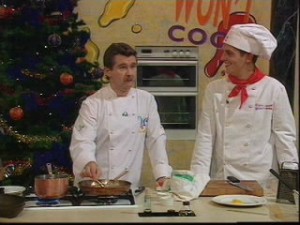 Kevin Woodford, a regular cook. (Bazal)
Kevin Woodford, a regular cook. (Bazal)A companion daytime show to Ready Steady Cook, this was the one where people nominated their husbands / students / children as reluctant chefs. The reluctant cooks were given a quick masterclass, a professional telly chef demonstrated how to whip up an easy dish, emphasis on the easy.
And then the new cooks had a go themselves, with results ranging from the heart-warming to the mouth-burning. Is this dish edible? Your friend will find out in a blindfolded taste test. Ainsley Harriott hosted most episodes, gregarious and expansive and welcoming. An early success for Bazal Productions, who'd go on to make Big Brother.
Five years on daytime telly, and then they just stopped making new episodes. Guess they had invented Bargain Hunt. 685 episodes.
Lots of "Celebrity" shows in our next instalment.
Top show tables
Shows beginning with numbers, or AAA-CAN.
Overall
| Show | Episodes |
| Bamboozle | 5900 |
| Big Brother | 4183 |
| Fifteen-to-One | 2683 |
| Bargain Hunt | 2085 |
| The Big Quiz (1) | 2000 |
| Brain of Britain / What Do You Know | 1592 |
| Blockbusters | 1586 |
| 100% | 1546 |
| Brainteaser | 1200 |
| Call My Bluff | 1047 |
| Antiques Road Trip | 905 |
| The Brains Trust | 691 |
| Can't Cook, Won't Cook | 685 |
It'll take another 400 episodes – about 25 years' worth – for Brain of Britain to overtake Steve Wright's The Big Quiz (1). And if any show is going to do it...
Primetime shows
| Show | Episodes |
| Big Brother | 4173 |
| Call My Bluff | 542 |
| The Apprentice | 468 |
| Blind Date | 416 |
| The Brains Trust | 416 |
| Britain's Got Talent | 383 |
| Bullseye | 369 |
| Blockbusters | 366 |
| Blankety Blank | 320 |
| Big Break | 252 |
| 8 Out of 10 Cats | 232 |
| Ask the Family | 221 |
| What Do You Know? | 200 |
| Artist of the Year | 175 |
| 8 Out of 10 Cats Does Countdown | 157 |
| 3-2-1 | 154 |
| BBC New Comedy Award | 149 |
| Ant and Dec's Saturday Night Takeaway | 141 |
| Britain's Next Top Model | 138 |
| The $64,000 Question | 137 |
| Animal, Vegetable, Mineral | 131 |
| Bob's Full House | 117 |
| Ask Me Another | 109 |
| Busman's Holiday | 103 |
Such irony. The Brains Trust, broadcasting's most erudite and intelligent programme, has as many primetime shows as Blind Date.
In other news
Countdown has had its summer final, for the 89th series champion. A cracking quarter-final between Mark Finnerty and Jack Harvey, Mark won by 104-100, in a game that was in doubt right to the final conundrum. He went on to play Michael Calder, who beat third seed Toby Byfield on a crucial conundrum.
Top seed Arthur Page had wrapped up an easy win over Isabelle Heward. He took on Jessica Pratesi, who'd ground out a 102-99 win over Mark Goodliffe. In their semi, Arthur raced to a 14-0 lead, only to be pegged back by his own gamble on "rankage", Jessica's winner "Hurrah", and some numbers work. Arthur's "Gweilos" was the spot of the day, as he won the match 102-90.
The second semi was another win for Michael Calder against the seeding. Mark Finnerty won with "Gelation" and "Marquis", but Michael hit back with "Acutely" and "Anchored", taking the lead and pushing Michael into a couple of errors – "Waspier" takes a capital W, and "Booteed" is not accepted for babywear. Michael won by 78-56.
The final was won by Arthur Page. "Egesting" was a remarkable word to spot, "Wideout" and "Tableside" were winners later in the game. Michael's challenge was made harder when he blobbed the first numbers game, and the invalid "openages" was a risk he had to take; its failure ended the game as a contest. Arthur won by 121-61, and has a total score across his eleven wins of 1299 points.
We may only just have crowned one champion, but Countdown never stops on Channel 4; a new series begins on Monday, and runs all the way to Christmas. Popmaster TV has its final (More4, Tue).
Continuing: Bake Off The Professionals (C4, Mon, Tue). Love Island continues (VM2 and ITV2), and there's just one Bargain Hunt (BBC1), on Thursday. Sewing Bee is on BBC1, a day later than usual (Wed). Next Saturday is subject to change because of football.
To have Weaver's Week emailed to you on publication day, receive our exclusive TV roundup of the game shows in the week ahead, and chat to other ukgameshows.com readers, sign up to our Google Group.


